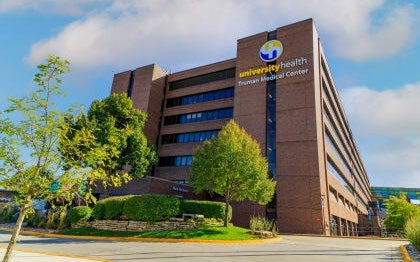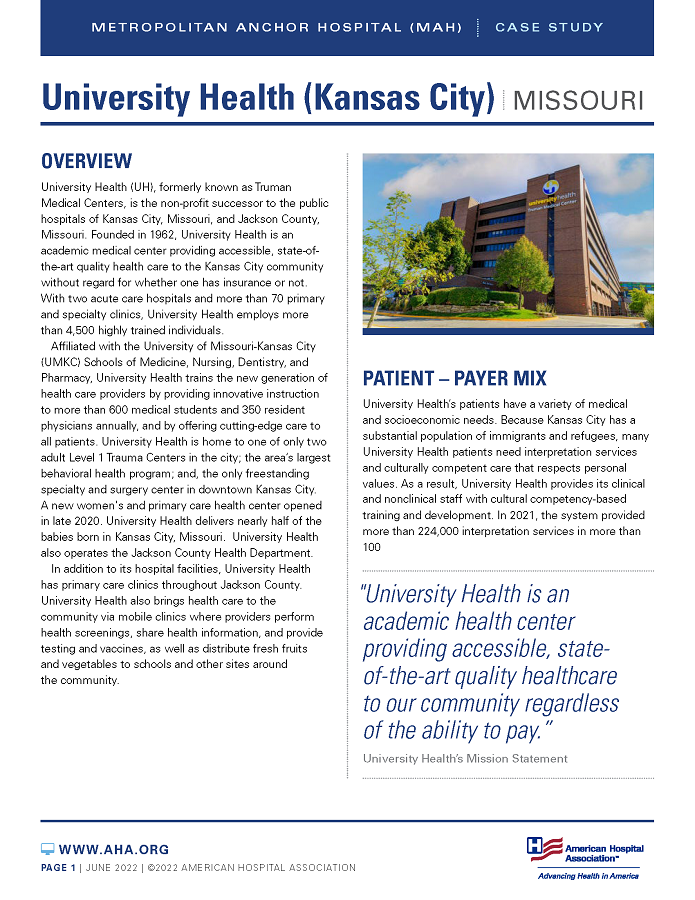

University Health (Kansas City) | Missouri
Metropolitan Anchor Hospital (MAH) | Case Study
Overview
 University Health (UH), formerly known as Truman Medical Centers, is the non-profit successor to the public hospitals of Kansas City, Missouri, and Jackson County, Missouri. Founded in 1962, University Health is an academic medical center providing accessible, state-of-the-art quality health care to the Kansas City community without regard for whether one has insurance or not. With two acute care hospitals and more than 70 primary and specialty clinics, University Health employs more than 4,500 highly trained individuals.
University Health (UH), formerly known as Truman Medical Centers, is the non-profit successor to the public hospitals of Kansas City, Missouri, and Jackson County, Missouri. Founded in 1962, University Health is an academic medical center providing accessible, state-of-the-art quality health care to the Kansas City community without regard for whether one has insurance or not. With two acute care hospitals and more than 70 primary and specialty clinics, University Health employs more than 4,500 highly trained individuals.
Affiliated with the University of Missouri-Kansas City (UMKC) Schools of Medicine, Nursing, Dentistry, and Pharmacy, University Health trains the new generation of health care providers by providing innovative instruction to more than 600 medical students and 350 resident physicians annually, and by offering cutting-edge care to all patients. University Health is home to one of only two adult Level 1 Trauma Centers in the city; the area’s largest behavioral health program; and, the only freestanding specialty and surgery center in downtown Kansas City. A new women's and primary care health center opened in late 2020. University Health delivers nearly half of the babies born in Kansas City, Missouri. University Health also operates the Jackson County Health Department.
In addition to its hospital facilities, University Health has primary care clinics throughout Jackson County. University Health also brings health care to the community via mobile clinics where providers perform health screenings, share health information, and provide testing and vaccines, as well as distribute fresh fruits and vegetables to schools and other sites around the community.
"University Health is an academic health center providing accessible, state-of-the-art quality healthcare to our community regardless of the ability to pay.”
University Health’s Mission Statement
Patient–Payer Mix
University Health’s patients have a variety of medical and socioeconomic needs. Because Kansas City has a substantial population of immigrants and refugees, many University Health patients need interpretation services and culturally competent care that respects personal values. As a result, University Health provides its clinical and nonclinical staff with cultural competency-based training and development. In 2021, the system provided more than 224,000 interpretation services in more than 100 languages, including Arabic, Somali, Spanish, Vietnamese, and American Sign Language.
As a metropolitan anchor hospital (MAH), about half of University Health’s patient population comes from historically marginalized communities; most patients are uninsured or underinsured. Together, Medicaid and Medicare make up 72% of all visits, 59.7% of all discharges, and 63.3% of net patient revenue. A relatively small percentage of patients have commercial insurance. Last year, University Health provided nearly $140 million in uncompensated care. MAHs like University Health face significant financial challenges, low margins, and workforce shortages—all of which have been greatly exacerbated by the COVID-19 pandemic. Yet despite these challenges, University Health continues to provide more uncompensated care than all other hospitals combined in Kansas City, as well as the most uncompensated care in the state of Missouri per capita.
University Health's Unique Approach to Care
To achieve its mission of providing accessible, state-of-the-art quality health care regardless of patients’ ability to pay, University Health leadership has worked to:
Engage with the Community
University Health maintains robust partnerships throughout the Kansas City community. For example, the Community Health Strategy & Innovation team finds new ways to educate Kansas City residents and promote long-term solutions to maintain a healthier lifestyle. Using a wellness connection model, community health nurses deliver preventive services in multiple locations. University Health also is proud to provide evidence-based programs designed to address social determinants, such as health education and access to care.
Recognizing the social and economic factors that influence health care outcomes, University Health utilizes cultural health navigators with its patients and operates the Healthy Harvest Mobile Market; a trauma-informed care education program; and, a nutritional education program. The system employs more than 40 social workers, connects the community with social services, including housing assistance, and maintains relationships with area transportation authorities to make it easier for patients to access the care they need. University Health also operates Missouri’s largest WIC program.
Foster a Culture of Diversity, Equity, and Inclusion
University Health believes it is essential to maintain a culture that values diversity, equity, and inclusion. This is evidenced by ranking first in Missouri and eighth in United States on the Lown Institute Hospital Index for Social Responsibility’s racial inclusivity ranking; ranking sixth on Forbes Magazine’s Best Employers for Diversity list in the Health and Social category; and, maintaining Leader status on the Human Rights Campaign’s Healthcare Equality Index for five consecutive years. To build a workforce that reflects the communities it serves, University Health has enhanced physician and provider recruitment at Historically Black Colleges and Universities and Hispanic Serving Institutions. In addition, the University Health Supplier Diversity Program works with historically underused businesses, such as Minority Owned Business Enterprises and Women Owned Business Enterprises, service-disabled veterans, and representatives of the LGBTQ+ community.
Metropolitan Anchor Hospitals Need Support
Despite the financial challenges MAHs face, University Health continues to support innovative programs to improve the health and wellbeing of the Kansas City community. University Health hopes to intensify its efforts, especially by strengthening its workforce and expanding the care it provides to its growing, diverse population. University Health, like all MAHs, must have more stable funding and resources. Without this support, innovation will stop, and patients will not thrive.


